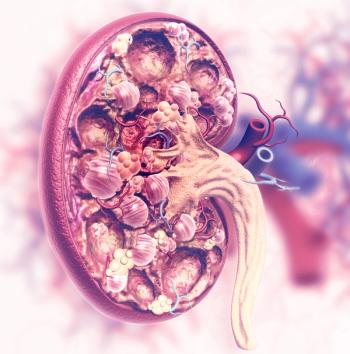
Findings from the phase 3 OCEAN trial did not confirm the clinical benefit of melphalan flufenamide as a treatment for patients with relapsed/refractory multiple myeloma.

Your AI-Trained Oncology Knowledge Connection!


Russ Conroy is an Associate Editor for CancerNetwork. He grew up in Hillsborough, New Jersey, and graduated from Rutgers University-New Brunswick in 2022.
On the weekends, he likes to unwind by playing video games with friends, tailgating at Rutgers football games with his family, or building his music collection with a visit to Princeton Record Exchange.

Findings from the phase 3 OCEAN trial did not confirm the clinical benefit of melphalan flufenamide as a treatment for patients with relapsed/refractory multiple myeloma.

Data from the phase 1 portion of the ARROS-1 trial support the breakthrough therapy designation for NVL-520 as a treatment for those with ROS1-positive non–small cell lung cancer.

ABCA12, CLIP1, and ATP13A3 somatic mutations appear to correlate with a vascular invasion phenotype in patients with poorly differentiated thyroid cancer.

Data from the phase 1/2 EPCORE NHL-1 trial support the supplemental biologics license application for epcoritamab as a treatment for patients with relapsed/refractory follicular lymphoma.

Data from the phase 3 RATIONALE 305 trial support the biologics license application for tislelizumab plus chemotherapy in advanced unresectable or metastatic gastric or gastroesophageal junction adenocarcinoma.

Findings from 3 phase 3 trials support the marketing authorization application for tislelizumab as a treatment for patients with non–small cell lung cancer in the European Union.

Emphasizing precise terminology in clinical studies may improve the transparency and accuracy of information presented at oncology conferences.

Preliminary findings from a phase 1 trial support the breakthrough therapy designation for BAY 2927088 as a treatment for those with unresectable or metastatic non–small cell lung cancer harboring HER2 mutations.

The European Medicine Agency’s Committee for Medicinal Products for Human Use’s recommendation of approving pembrolizumab plus chemotherapy in resectable non–small cell lung cancer is based on results from the KEYNOTE-671 trial.

Investigators are currently evaluating treatment with IMM-1-104 in pancreatic cancer and other disease types associated with the RAS pathway as part of a phase 1/2a study.

Findings from a retrospective study demonstrate the feasibility of using brexucabtagene autoleucel to treat patients with relapsed/refractory B-cell acute lymphoblastic leukemia with central nervous system involvement.

Data from the phase 1/2 LINKER-MM1 trial support the biologics license application for linvoseltamab as a treatment for patients with relapsed/refractory multiple myeloma.

The FDA has set a Prescription Drug User Fee Act date of June 21, 2024 for adagrasib plus cetuximab as a treatment for patients with previously treated KRAS G12C-mutated colorectal cancer.

Patients with relapsed/refractory multiple myeloma can now receive teclistamab at 1.5 mg/kg every 2 weeks following the FDA’s latest approval.

Data from the phase 3 NRG-GY018 trial support the supplemental biologics license application for pembrolizumab plus chemotherapy as a treatment for those with primary advanced or recurrent endometrial cancer.

Findings from the phase 3 TROPION-Lung01 trial support the biologics license application for datopotamab deruxtecan as a treatment for those with advanced nonsquamous non–small cell lung cancer.

Practices should not differentiate treatment options based on race for patients with metastatic renal cell carcinoma, according to Jasmeet Kaur, MD.

Findings from the phase 2 UNICORN trial support osimertinib as a potential treatment option for patients with metastatic non–small cell lung cancer harboring uncommon EGFR mutations.

Data from the phase 3 EV-302 trial support the supplemental biologics license application for enfortumab vedotin plus pembrolizumab for patients with advanced or metastatic urothelial cancer in Japan.

Measurable residual disease–guided ibrutinib plus venetoclax in chronic lymphocytic leukemia appears to be particularly beneficial in patients with unmutated IGHV and specific genetic abnormalities.

The National Comprehensive Cancer Network has issued a category 2A recommendation for the use of goserelin for ovarian function suppression in those with breast cancer.

Data from the phase 3 FLAURA 2 trial support the FDA approval of osimertinib plus chemotherapy for treating patients with EGFR-mutated non–small cell lung cancer.

Data from the phase 3 RATIONALE-315 study support the use of perioperative tislelizumab plus neoadjuvant chemotherapy in resectable stage II to IIIA non–small cell lung cancer.

Findings from a study raise concerns for the outcomes of individuals who experience an adverse financial event prior to a cancer diagnosis.


The FDA is expected to issue a Prescription Drug User Fee Act date for denileukin diftitox in cutaneous T-cell lymphoma within 30 days of accepting the biologics license application resubmission.

Investigators report clinical benefit with sacituzumab govitecan plus pembrolizumab across all prespecified patient subgroups with metastatic urothelial cancer in cohort 3 of the phase 2 TROPHY-U-01 trial.

The FDA set a Prescription Drug User Fee Act date of June 15, 2024 for repotrectinib as a treatment for those with advanced or metastatic solid tumors harboring an NTRK gene fusion.

Results from a phase 2 trial support the safety and tolerability of VGT-309 in patients with suspected lung cancer who undergo standard-of-care surgical resection.

The final overall survival analysis of trilaciclib plus chemotherapy in patients with metastatic triple-negative breast cancer as part of the PRESERVE 2 trial will take place in the third quarter of 2024.